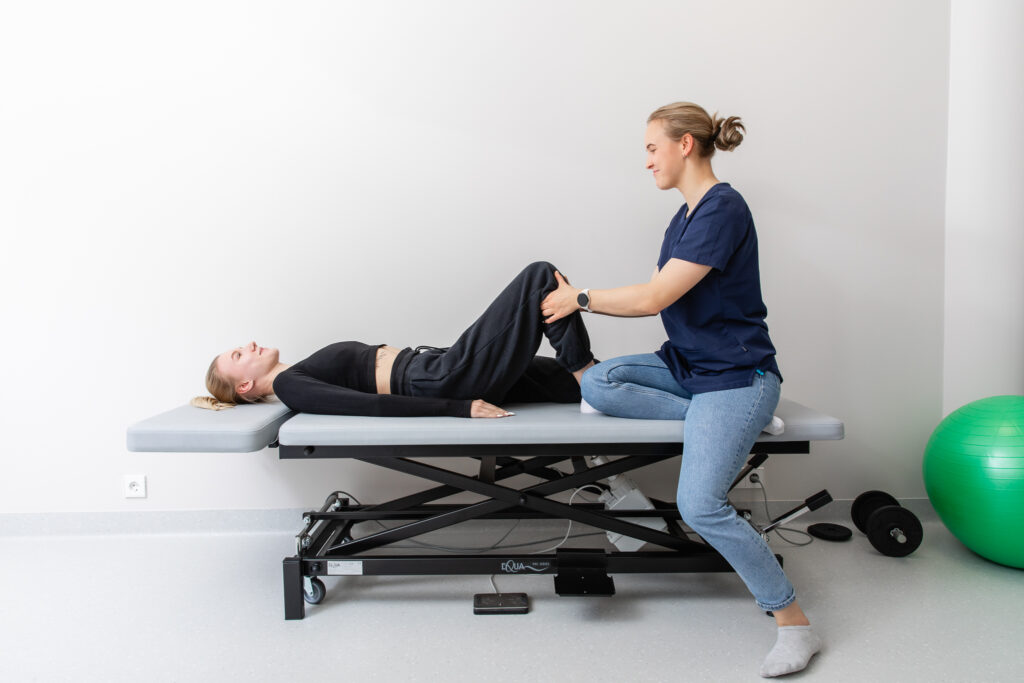Services
We offer physiotherapy services for a wide range of health issues, as well as coaching.

Physiotherapy for musculoskeletal problems and injuries
Common musculoskeletal problems include lower back pain, muscle tension in the neck and shoulder area, or joint pain. You can also come to us for pre- and post-surgery therapy, as well as for restoring movement functions after fractures, traffic accidents, or other injuries.
Specialists: Artjom Timtšuk, Diana Trutneva, Aarto Pihlapuu, Liisi Sagor, Kätlin Laurson, Lisette Tõnutare, Ann Brit Altmets, Anna-Britt Kivimägi, Tamara Gebenova, Ragnar Koplimaa, Anna-Maria Drobuževa, Maret Müür
Physiotherapy for neurological problems
There are various complex health conditions that physiotherapists focusing on neurological problems deal with, but patients most often seek help in cases of acute nervous system diseases, such as post-stroke conditions, traumatic brain injuries, spinal cord injuries, Parkinson’s disease, and others.
In addition to physical challenges, neurological disorders often involve psychological problems, memory issues, and difficulties with speaking or understanding speech – therefore learning different movements and activities can take more time.
Physiotherapists actively involve the patient in thinking and acting, helping to restore nervous system and body functions and making everyday life easier.
Specialists: Diana Trutneva, Liisi Sagor, Lisette Tõnutare, Tamara Gebenova
Physiotherapy for cardiopulmonary problems
In the case of cardiopulmonary problems such as heart and lung diseases, physiotherapy focuses primarily on training the respiratory muscles and improving cardiovascular endurance. The physiotherapist teaches breathing techniques, helps restore physical stamina, and provides exercises that enable the body to absorb oxygen more effectively and better tolerate physical exertion.
Specialists: Diana Trutneva, Aarto Pihlapuu
Physiotherapy for oncological problems
Physiotherapy for cancer patients is used both alongside cancer treatment and after it. Physiotherapy helps to relieve side effects of treatment such as fatigue, reduced mobility, and pain, while also supporting and accelerating recovery. The physiotherapist provides exercises aimed at restoring or improving impaired functions or adapting to disabilities, helping the patient achieve the best possible quality of life.
Specialists: Diana Trutneva
Prenatal and postnatal physiotherapy
Prenatal physiotherapy focuses on preparing the mother’s body for childbirth and relieving muscle and joint discomfort that may occur during pregnancy. Postnatal physiotherapy helps the mother recover from childbirth, strengthen the pelvic floor muscles, and restore overall physical fitness.
Specialists: Anneli Belkin, Maret Müür, Mona Mia Lember
Pelvic floor physiotherapy
Pelvic floor disorders can occur in both women and men of all ages. In women, symptoms include stress urinary incontinence, pelvic organ prolapse, constipation, or slow bladder emptying; in men, pelvic pain and erectile problems may occur. The physiotherapist assesses the pelvic floor and creates an individual treatment plan, which also includes a home exercise program. The therapist teaches how to use the pelvic floor muscles more consciously to control bladder and bowel function.
Specialists: Anneli Belkin, Maret Müür, Mona Mia Lember
Pediatric physiotherapy
A pediatric physiotherapist assesses and, if necessary, develops a child’s physical abilities. The therapist can provide support, for example, in improving muscle tone and coordination or in recovery after surgery and injury. The physiotherapist designs suitable exercises that are playful and support the child’s development. Different therapists specialize in working with children aged 0–3 and 4–15 years.
Specialists: Anneli Belkin, Liisi Sagor
Sports physiotherapy
In the case of sports injuries, the goal of therapy is to relieve pain and restore movement function, primarily through specific exercises. Sports injuries are generally divided into two categories: traumatic injuries and overuse injuries. The physiotherapist examines the injured area, identifies the cause of the problem, and creates a treatment plan.
Anyone who is actively engaged in sports and seeks advice on maintaining good health can turn to a physiotherapist. We help reduce the risk of overuse and injuries and support faster recovery from health issues.
Specialists: Artjom Timtšuk, Diana Trutneva, Aarto Pihlapuu, Liisi Sagor, Kätlin Laurson, Lisette Tõnutare, Ann Brit Altmets, Anna-Britt Kivimägi, Tamara Gebenova, Ragnar Koplimaa, Anna-Maria Drobuževa, Maret Müür
Coaching
While physiotherapy focuses primarily on improving the body’s functions, coaching helps to organize thoughts and strengthen mental resilience. Coaching raises awareness of the connection between thoughts and emotions and, when necessary, helps to change automatic patterns. Working with a trusted coach makes it possible to create clarity in both personal and professional life, discover one’s potential, achieve goals, and improve overall well-being. The coaching methodology includes listening, reflecting, and asking questions, which helps a person find answers and gain clarity in an open and non-judgmental environment.